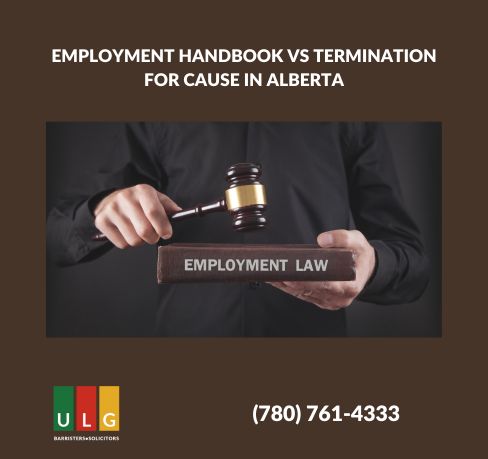By Ralph Ike Epelle
Many times, upon recruitment, Employees receive an “employee handbook” from their new employers in addition to an employment contract. Many times, the Employee Handbook spells out amongst other things, the following:
a. Rules and Regulations of the Employer;
b. What may constitute or may not constitute Just Cause for termination;
c. How Just Cause allegations are investigated by the Employer;
d. Obligations, benefits and rights of the Employee.
Very frequently, terms and conditions inherent in the Employee Handbook go on to form implied terms in an employment contract.
What are implied terms?
When a contract is put in writing, the terms as explicitly written into the contract are said to be expressed terms. On the contrary, terms which are not written into the contract but which remain enforceable are noted as implied terms.
Canadian law recognizes situations where a provision (term or condition) where not explicitly stated in a written or oral contract, is considered a part of the employment agreement by law or on account of necessity to give effect to the intentions of the parties (employer and employee).
Looking to Energy Fundamentals Group1, the Court agreed that a contractual term may be implied“on the basis of the presumed intentions of the parties where necessary give business efficacy to the contract or where it meets the “officious bystander test”.2
Referring with approval to the case of Shirlaw v. Southern Foundries (1926) Ltd., [1939] 2 K.B. 206, [1939] 2 K.B. 206, the Court also acknowledged that implied terms are terms which obvious at first sight are left to be implied and need not be expressed (written down/expressly incorporated) in a contract.
For instance, It is an implied term of every employment contract that an employee must attend work. When an employee fails to comply with that term, she or he may be taken to have abandoned or repudiated the contract, entitling the employer to treat the contract as being at an end: Smith v Mistras Canada, Inc, 2015 ABQB 673 at para 33.3
Additionally, common law implies a term in an indefinite employment contract will not be terminated without just cause, unless there is reasonable notice. Absent unconscionability or other legal reason, the implied term will be displaced by a clause that clearly specifies some other period of notice, and which complies with minimum statutory notice provisions as articulated and contemplated by Provincial Legislation. If the clause provides, or potentially provides, less than the minimum statutory notice, it is null and void.4
Modern Test: Business Efficacy Test
The business efficacy test as pronounced in Attorney General of Belize v. Belize Telecom Ltd., [2009] UKPC 10, [2009] 2 All E.R. 1127, the Court noted that the implication of a contractual term does not require that a party actually thought about the said term or expressly agreed to it.
Most of the time, terms are implied to fill gaps to which the parties did not turn their minds in a business transaction (whether business/commercial or employment).5
Conversely, Courts will not imply a term that contradicts the express language of the contract, or is unreasonable6:
It is the writer’s opinion that the terms and/or conditions incorporated in an Employee Handbook, as presented to an Employee during the recruitment process, is at that point necessary to give business efficacy to the employment contract, even where the parties did not actually think about some or all of the said terms inherent in the Employee Handbook.
In Stonham v Recycling Worx Inc, 2023 ABKB 629, the Alberta Court of King’s Bench at paragraph 58 opined that where an Employee is presented with a Handbook prior to commencing their employment or as a condition of being hired, the terms of the Handbook go to form implied contractual terms of employment.
Just Cause Termination v. Employee Handbook
Oft times, situations arise where the employee Handbook dictates what would constitute termination (just cause and without cause). Where the employment contract is silent as to what would constitute termination (just cause or without cause), the terms of the employee handbook, as well as how investigations surrounding Just Cause allegations form part of the employment contract.7
Thus, where the Handbook dictates certain procedures which must be followed in order to investigate Just Cause allegations, such procedure(s) must be followed. Anything otherwise, may amount to a wrongful dismissal lawsuit.
Finally, it is important to seek legal counsel should you find yourself in a position where:
a. As an employer, you wish to terminate an employment relationship;
b. As an employee, your employment has been terminated (on a without cause or just cause basis).
Conclusion
Employees and employers alike are strongly encouraged to seek legal counsel in situations alleging Just Cause Termination.
_______________________________________________________________
1 Energy Fundamentals Group Inc. v. Veresen Inc., 2015 ONCA 514 (CanLII)
2 M.J.B. Enterprises Ltd. v. Defence Construction (1951) Ltd., 1999 CanLII 677 (SCC), [1999] 1 S.C.R. 619 in Energy Fundamentals Group Inc. v. Veresen Inc., 2015 ONCA 514 (CanLII)
3 Cited with approval in Stonham v Recycling Worx Inc, 2023 ABKB 629
4 Linza v Metric Modular, 2023 BCSC 1196
5 See also Belize Telecom v. Belize Telecom Ltd., [2009] UKPC 10, [2009] 2 All E.R. 1127, para. 31
6 Belize v. Belize Telecom Ltd., [2009] UKPC 10, [2009] 2 All E.R. 1127; See also G. Ford Homes Ltd. v. Draft Masonry (York) Co. Ltd. (1984), 1983 CanLII 1719 (ON CA), 43 O.R. (2d) 401 (C.A.).
7 Stonham v Recycling Worx Inc, 2023 ABKB 629 (See paragraph 58)

